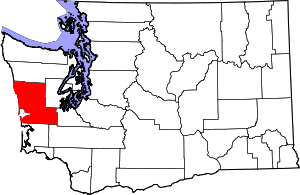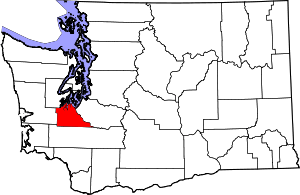Confederated Tribes of the Chehalis Reservation
The Confederated Tribes of the Chehalis Reservation is a federally recognized tribe of Upper and Lower Chehalis, Klallam, Muckleshoot, Nisqually, and Quinault peoples.[3] They are one of the Northern Straits branch Central Coast Salish peoples of indigenous peoples of the Northwest Coast. Their tribe is located in southwest Washington.
 Chehalis coiled cedar root basket, collection of the Washington State History Museum | |
| Total population | |
|---|---|
| 833 enrolled members[1] | |
| Regions with significant populations | |
| Languages | |
| English and formerly Upper and Lower Chehalis languages[2] | |
| Religion | |
| traditional tribal religion | |
| Related ethnic groups | |
| other Chehalis, Klallam, Muckleshoot, Nisqually, and Quinault peoples[3] |
The Confederated Tribes' traditional territories were along the Black, Chehalis, Cowlitz, Elk, Johns, Newaukum, Satsop, Shookumchuck, and Wynoochee Rivers, and near Grays Harbor and on the lower Puget Sound of Washington.[4]
Reservation
The Chehalis Reservation is 4,438 acres (17.96 km2) large, and 661 American Indians, mostly tribal members, live on the reservation. The reservation was first established in 1860 for the Lower and Upper Chehalis people. Originally 4,224.63 acres (17.10 km2) larger, 3,753.63 acres (15.19 km2) of land were distributed to non-native settlers through an 1866 Executive Order. An additional 471 acres (1.91 km2) were given to schools. More land was taken from the tribe. In 1906, only 149 Chehalis people remained on the reservation, and only 382 lived there in 1984.[5]
Government
The Confederated Tribes of the Chehalis Reservation's headquarters is in Oakville, Washington. The tribe is governed by a five-member, democratically elected General Council. They ratified their constitution and bylaws on 15 July 1939.[5]
Language
English is commonly spoken by the tribe. Their traditional languages include Upper Chehalis and Lower Chehalis languages, which are Quinault languages that belong to the Tsamosan branch of the Salish language family.[2] The last native speaker of the Upper Chehalis language died in 2001.[8]
Economic development
The Chehalis Tribe owns and operates Lucky Eagle Casino, Eagles Landing Hotel, Grand Buffet, Scatter Creek Grill, Prime Rib and Steakhouse, and Sidewalk Deli in Rochester, Washington,[9] and the Great Wolf Lodge Resort in Grand Mound, Washington. It also owns three convenience stores, a fast food restaurant, two construction companies, and a cigarette stamping business. The tribe employs 1,498 people.[1]
Notes
- "Chehalis Tribe." Archived 2013-06-02 at the Wayback Machine Northwest Portland Area Indian Health Board. Retrieved 18 Sept 2013.
- "Tsamosan." Ethnologue. Retrieved 18 Sept 2013.
- Pritzker 205
- "Our Story." Archived 2013-09-22 at the Wayback Machine The Chehalis Tribes. Retrieved 19 Sept 2013.
- "Confederated Tribes of the Chehalis Reservation." Archived 2013-10-02 at the Wayback Machine Governors Office of Indian Affairs. Retrieved 18 Sept 2013.
- "Chehalis Tribe names Harry Pickernell Sr. its chairman," The Daily World. July 1, 2017. Retrieved December 6, 2018.
- "Tribal Directory." National Congress of American Indians. Retrieved 19 Sept 2013.
- "Chehalis, Upper." Ethnologue. Retrieved 18 Sept 2013.
- "Lucky Eagle Casino." 500 Nations. Retrieved 18 Sept 2013.
References
- Pritzker, Barry M. A Native American Encyclopedia: History, Culture, and Peoples. Oxford: Oxford University Press, 2000. ISBN 978-0-19-513877-1.
External links
- Chehalis Tribe, official website
- Confederated Tribes of the Chehalis Reservation, official website

